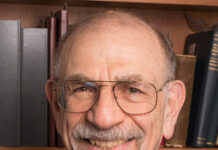By Rabbi Craig Axler
Special to WJW
This week’s Torah portion is Ki Tavo,
Deuteronomy 26:1 – 29:8.
As we approach the end of our Torah reading cycle, we find ourselves this Shabbat at Parshat Ki Tavo with so much yet to be said, and Moses’ need in these last few messages to solidify the people’s faith in God. Toward the beginning of the portion there are a pair of verses that could easily be overlooked, but are worth our attention, particularly as we approach these High Holy Days.
“You have affirmed this day that the Eternal is your God, in whose ways you will walk, whose laws and commandments and rules you will observe, and whom you will obey. And the Eternal has affirmed this day that you are, as promised, God’s treasured people who shall observe all the divine commandments…” [Deuteronomy 26:17-18].
Revealing the exalted poetry of the Torah text, the double-use of the word translated here as “affirmed” brings home a critical point: The relationship between us and God is one of mutuality, in which each party has responsibilities toward and sacred expectations of the other.
“You have affirmed Adonai… And Adonai has affirmed you.” The verb root in “affirmed” is alef-mem-resh, the same root used thousands of times in the Torah where it connotes speech: “And God spoke to Moses…”
But the two verses in this week’s parshah are the only instances of the root appearing as “affirmed.” One thing we can draw from this is that the way we and God affirm one another as special is through the power of holy speech.
Jewish theology tends to view God through a hierarchical lens (God is “there” while we are “here”), but it is particularly appropriate for this image of closeness and intimacy to come at this specific moment in the Jewish year. Ki Tavo arrives just a short while before Rosh Hashanah and there is a teaching that God is like a king who typically stays in the palace. All who wish to be considered by the king must come to him, to the capital city.
However, once a year the king makes rounds through his whole realm, visiting and listening, becoming more directly available to all by traveling to them. In the parable, this is the month of Elul, the current Hebrew month that leads us to the spiritual mountain of the High Holy Days.
Avinu malkeinu — Our Parent, Our Sovereign — soon we will sing these words together in sanctuaries (and living rooms), gathered with the Jewish community across time and space, standing before the ark and praying this ancient formula.
One of my favorite introductory passages in the Reform movement’s machzor includes the following thought: “There are many who say to the works of their hands, you are our gods. But when our worship centers on our own creations, we feel less gratitude, more doubt and despair. This is the paradox of our spiritual lives: we grow smaller in self-exaltation, nobler when we reach for You.”
We are, indeed, in a relationship with God — a relationship of mutual affirmation through which we make each other, as it were, more real and increasingly holy. In the commentary we find a truly radical thought: “There is no Parent without a child, there is no sovereign without a people.” Our act of affirmation and prayer, individually and as a people, makes God truly God. And listening ever so carefully, we hear back the affirmation of God that makes our lives infinitely more holy.
Rabbi Craig Axler is rabbi of Temple Isaiah.






